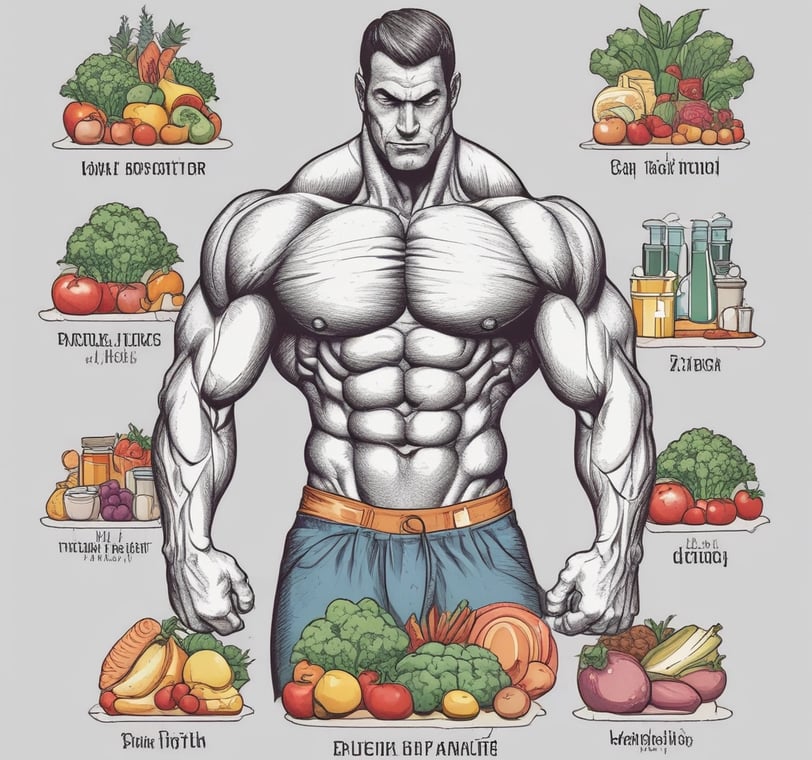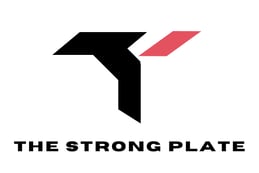The Role of Nutrition in Building Muscle: What You Need to Know
Learn how proper nutrition fuels muscle growth. Discover the best protein, carbs, and healthy fats for muscle building, plus key micronutrients and hydration tips to maximize gains.
NUTRITION FOR FITNESS
2/5/20253 min read


Why Nutrition is Key for Muscle Growth
When it comes to building muscle, many beginners focus solely on their workouts—pushing themselves to lift heavier weights and increase training volume.
However, what you eat plays just as big of a role in muscle development as your time in the gym. Without proper nutrition, your body won’t have the fuel it needs to repair and grow muscle tissue.
Muscle growth, or hypertrophy, occurs when muscle fibers undergo small tears from resistance training and then repair themselves to become bigger and stronger.
This process requires a combination of protein for muscle repair, carbohydrates for energy, and healthy fats for hormone production. Additionally, micronutrients and proper hydration support overall muscle function and recovery.
If you’re looking to build muscle efficiently, you need to focus not only on lifting weights but also on optimizing your diet. In this article, we’ll break down the key nutrients you need to maximize muscle growth and give you actionable steps to build a nutrition plan that supports your fitness goals.
Protein: The Building Block of Muscle
Protein is the most important macronutrient for muscle growth. It provides your body with amino acids, the essential components needed to repair and build muscle tissue after a workout. Without adequate protein intake, your muscles won’t recover properly, leading to slow progress or even muscle loss.
How Much Protein Do You Need?
A general guideline for muscle growth is 1.6–2.2 grams of protein per kilogram of body weight (or 0.7–1.0 grams per pound).
For example, if you weigh 174 pounds (79 kg), you should aim for 125–175 grams of protein per day.
Best Protein Sources for Muscle Growth
Lean meats: Chicken breast, turkey, lean beef
Fish and seafood: Salmon, tuna, shrimp
Dairy products: Greek yoghurt, cottage cheese, milk
Plant-based proteins: Lentils, chickpeas, tofu, tempeh
Protein supplements: Whey or plant-based protein powder (helpful if you struggle to meet protein goals)
To maximize muscle protein synthesis, aim to distribute your protein intake evenly across 3–5 meals per day, rather than consuming it all in one sitting.
Carbohydrates and Fats: Essential Energy Sources
While protein is essential for muscle repair, carbohydrates and fats provide the energy your body needs to perform at its best during workouts and recover efficiently afterwards.
The Role of Carbohydrates
Carbohydrates are your body’s primary energy source. When you train, your muscles use glycogen (stored carbohydrates) for fuel. Without enough carbs, you’ll experience fatigue, decreased performance, and slower recovery.
Daily Carb Intake for Muscle Growth: Aim for 4–6 grams of carbs per kilogram of body weight (or 1.8–2.7 grams per pound).
Best Carb Sources:
Whole grains (brown rice, quinoa, oats)
Fruits and vegetables
Legumes (beans, lentils)
Starchy vegetables (sweet potatoes, squash)
Tip: Prioritize complex carbohydrates over refined carbs to maintain steady energy levels.
The Role of Healthy Fats
Fats are crucial for hormone production, especially testosterone, which plays a major role in muscle growth. Healthy fats also support joint health and reduce inflammation, making recovery easier.
Daily Fat Intake for Muscle Growth: 0.8–1.0 grams per kilogram of body weight (or 0.3–0.4 grams per pound).
Best Fat Sources:
Avocados
Nuts and seeds
Olive oil and coconut oil
Fatty fish (salmon, mackerel)
While fats are essential, they are calorie-dense, so keep an eye on portion sizes to avoid excessive calorie intake.
Micronutrients and Hydration: Supporting Recovery and Performance
Beyond macronutrients, micronutrients and hydration play a vital role in muscle function and recovery.
Key Micronutrients for Muscle Growth
Vitamin D: Supports bone health and muscle function (found in sunlight, fatty fish, egg yolks).
Calcium: Helps with muscle contraction (found in dairy, leafy greens, almonds).
Magnesium: Aids in muscle relaxation and recovery (found in nuts, seeds, spinach).
Iron: Supports oxygen delivery to muscles (found in red meat, beans, lentils).
The Importance of Hydration
Even mild dehydration can lead to muscle cramps, decreased strength, and slower recovery.
Daily Water Intake: Aim for 3–4 litres (100–135 ounces) per day.
Hydration Tip: Consume electrolytes (sodium, potassium, magnesium) after intense workouts to replenish what’s lost in sweat.
Conclusion: Creating a Muscle-Building Nutrition Plan
To maximize muscle growth, you need to combine smart training with proper nutrition. Here’s a simple action plan:
Prioritize Protein: Consume 1.6–2.2g per kg of body weight daily from high-quality sources.
Fuel with Carbs: Eat 4–6g per kg of body weight to sustain energy and performance.
Include Healthy Fats: Get 0.8–1.0g per kg of body weight to support hormone production.
Optimize Micronutrients: Ensure you’re getting enough vitamins and minerals from whole foods.
Stay Hydrated: Drink at least 3–4 liters of water per day to prevent muscle fatigue and cramps.
By focusing on these key nutrition principles, you’ll fuel your workouts, enhance recovery, and maximize muscle gains. Ready to take your muscle-building nutrition to the next level? Start by tracking your meals and making small adjustments to optimize your progress!
Passionate insights on fitness and nutrition topics.
info@thestrongplate.com
© 2024. All rights reserved.


